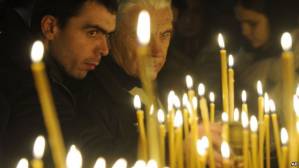More and more Ukrainians call Holodomor 1932-32 genocide

The “Rating” Sociological Group has published the results of a survey in which 59% of the respondents agreed with the statement “Holodomor was genocide of the Ukrainian people”. The number of people who disagree is decreasing each year.
The survey broke this down into regions and found that around 80% of people living in the west, centre and north of Ukraine, half of those in the south and a third in the east agree with the statement. One in four residents of the Donbas region considers Holodomor to have been genocide.
By comparing this with previous surveys, the analysts conclude that the number of those denying that Holodomor was genocide has fallen by a third.
On 24 November people throughout the world will be marking the eightieth anniversary of Holodomor. As well as a national moment of silence, the Light a Candle action and a remembrance procession to the Memorial to the Victims of Holodomor, there will also be other events.
This year, for example, the organizers of the remembrance procession will be remembering not only the victims of the tragedy, but those who helped Ukrainians survive during the Famine. Historians from the Liberation Movement Research Centre have put together a list of those who saved people with a description of their actions. They learned of these acts from the people themselves who wrote to them. There are 150 people whose actions are remembered in the book “Humanity in an inhuman time”.
One of the people was Ivan Osadchuk, head of a collective farm in the village of Nova Chortoriya (Zhytomyr oblast). Nobody starved in the village, since they were all given food from the collective farm canteen. Ivan Osadchuk also organized deliveries of food through connections with a neighbouring military unit and hid grain during checks.
“When they were starving people to death, sharing grain was a feat. The fate of those people reminds us that heroism is always possible”, historian at the Centre Volodymyr Viatrovych says.
Yaryna Yasnevych from the public committee for organizing remembrance events says that they plan to read out the names of each of those who saved people. At the moment all opposition parties have confirmed that they will attend and they are awaiting a response from the ruling party.
Candles will be lit throughout the country (and, of course, in others) from 16.00 on 24 November.





